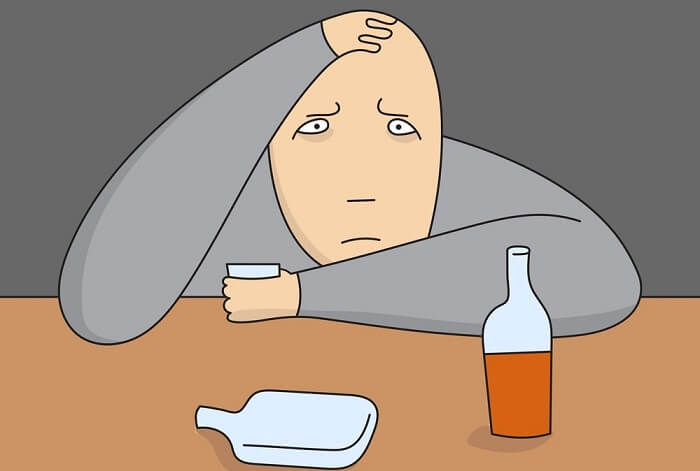Alcohol use is quite common in our society and is not typically cause for concern. However, some people may use alcohol in unhealthy ways, leading to alcohol abuse. Alcohol use disorder ranges from mild to severe. Behaviors such as binge drinking and alcoholism are common manifestations of this disorder.
This article is not intended to diagnose or treat any medical condition and should not be used as a substitute for professional medical advice. If you suspect that you or a loved one has a problem with alcohol, please seek professional assistance.

What is Alcohol Use Disorder?
According to the National Institute on Alcohol Abuse and Alcoholism:
Problem drinking that becomes severe is given the medical diagnosis of ‘alcohol use disorder’ or AUD.
We commonly think of alcoholism when we think of AUD, but that is only one expression of this disorder. Binge drinking and heavy drinking are also under the umbrella of AUD.
Symptoms of Alcohol Use Disorder
AUD is unique in that, typically, patients can determine their own diagnosis, unlike other disorders which require testing and professional evaluation. Symptoms of AUD include:
- inability to limit or cut down on the amount of alcohol one consumes, even though the individual may want to cut down on his or her intake;
- strong cravings for alcohol;
- inability to perform duties or obligations at home or at work due to intoxication, recovery from intoxication, or withdrawal symptoms;
- use of alcohol in unsafe situations such as driving;
- a need for increasing amounts of alcohol to feel the effects;
- withdrawal from social activities;
Causes of Alcohol Use Disorder
Substance use disorders such as AUD tend to run in families. However, there is still not enough solid evidence that it comes down to just genetics. Several studies have confirmed that there is a genetic component to AUD and other substance use disorders. However, genetics only account for approximately half of a person’s risk for developing AUD. Environment is a crucial aspect in determining a person’s risk. The age at which a person first begins drinking is a main contributor to the development of AUD. The younger a person first starts drinking, the more likely that person is to become dependent on alcohol.
Other Issues that Relate to Alcohol Use Disorder
People with other mental health disorders such as depression, bipolar, and schizophrenia have a greater risk of developing AUD and other substance use disorders. Prolonged alcohol use can lead to a change in brain function and chemistry, leading the person to seek out alcohol just to feel “normal.” These brain changes can intensify symptoms of other co-existing disorders, especially those of depression and anxiety. People with AUD who also have other disorders should seek treatment for their other symptoms when trying to address their alcohol use.

Alcohol Use Disorder Treatment Options
The medications naltrexone and acamprosate can be beneficial for some people with AUD, specifically those who have a particular gene that contributes to their AUD. These medications work by preventing alcohol from producing good feelings in the brain. Other medications work by causing a physical reaction to alcohol consumption, typically nausea or vomiting. This creates a psychological association between drinking and vomiting, decreasing the desire to drink.
Medication is not appropriate for every person with AUD. Therapy can be extremely beneficial in treating AUD. Peer group therapy has been shown to greatly improve the outcome of AUD treatment. Organizations such as Alcoholics Anonymous provide support for people with AUD, giving them an outlet for their negative emotions and providing them a safe place to talk about their behaviors while getting ideas for alternative outlets.
Treatment for other health and mental disorders is crucial for individuals in treatment for AUD. Since many people turn to alcohol to help them cope with symptoms of other conditions, treating these underlying conditions is essential in curbing the desire for alcohol. If one does not address these other symptoms, the cravings are much more likely to return.
Alcohol abuse can have a significant impact on the family and friends of an individual with AUD. Organizations such as Alanon provide support for family members that dealt with the addiction of someone close. These support organizations are extremely beneficial in helping to repair damaged relationships, which in turn can help to relieve the stress that may lead a person to drink.
Alcohol Use Disorder Examples in Popular Culture
AUD in its varying forms is commonly portrayed in television shows and movies. People with AUD are used for comedic relief, as sympathetic characters, and even villainized in popular culture. The Showtime series Shameless features a main character suffering from chronic alcoholism. Subsequently, they some of the difficulties that his alcohol abuse presents for him and his children. Otis Griffin on The Andy Griffith Show was the town drunk, portrayed as an oaf and the butt of numerous jokes over the series’ run. Miss Hannigan, the wretched orphanage matriarch in the musical Annie, frequently has a drink in her hand and is never fully dressed for the day.
Television and movie characters with AUD are typically “flat” characters, either always funny or always tragic, ignoring the multifaceted reality that real people with AUD face on a daily basis. This treatment of AUD in the media contributes to a widespread misunderstanding of alcohol dependency and discourages some individuals with AUD from getting help, fearing shame and ostracism.

Have you or someone you love suffered from AUD? Please share your story in the comments. If you suspect that you or a loved one may have AUD, seek professional help right away. While there is no cure for AUD, there is hope.
Images taken from depositphotos.com.
